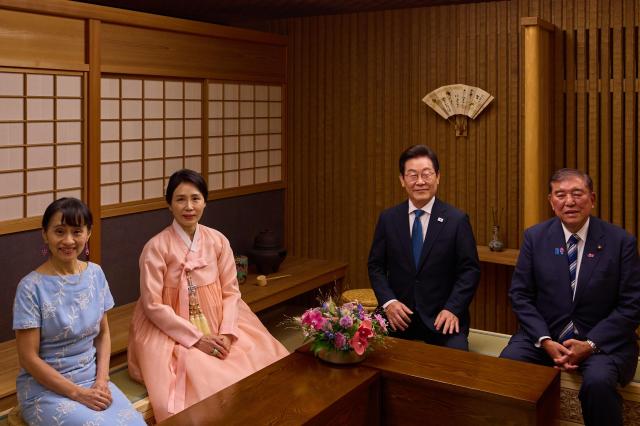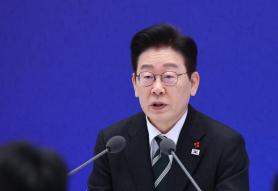
SEOUL, August 24 (AJP) - South Korean President Lee Jae Myung and Japanese Prime Minister Ishiba Shigeru shared hometown dishes at a dinner in Tokyo on Saturday, shortly after their summit, underscoring a cooperative tone, South Korea's Presidential Office said Sunday.
National Security Director Wi Seong-rak said on August 24 that the meal was held in a friendly atmosphere at the prime minister’s residence. The leaders were joined by their spouses. From South Korea, Wi and Presidential Policy Chief Kim Yong-beom attended. From Japan, Foreign Minister Iwaya Takeshi and Deputy Chief Cabinet Secretary Tachibana Keiichiro were present.
The menu paired specialties from both leaders' home regions. The table featured "Ishiba-style" curry, Andong jjimdak, a traditional Korean menu with chicken, glass noodles, and vegetables simmered in a soy sauce-based stew-like sauce, Andong soju, and beer from Tottori Prefecture.
The courses also included sake, Korean-style grilled eel with kimchi garnish, and white peaches from Okayama, reflecting President Lee’s preference for peaches. Wi said the selection of Andong soju and Tottori beer appeared intended to emphasize cooperation and reconciliation.
During the meal, Ishiba said he ate curry often during his college years. Lee replied, "I can picture a young Prime Minister Ishiba eating curry while listening to the Japanese girl group Candies." Lee added, "Because Prime Minister Ishiba likes Korean ramen, I tried to bring every ramen on the market, but I gave up because of the volume."
Ishiba told Lee he had read the Japanese translation of Lee's autobiographical essay "I Came This Far Because I Had That Dream" and asked him to sign it. The leaders also spoke while looking into photos of Andong sites, including Hahoe Village, Dosan Seowon, and Wolyeonggyo.
The conversation turned to political life and public communication. Presidential spokesperson Kang Yoo-jung said in a statement that both leaders noted that they were not mainstream politicians, yet rose to office after setbacks. Ishiba said, "I cannot sleep because I am replying late into the night to messages people send." Lee responded, "I am also busy sending messages, but I mostly send texts to instruct people to work."
Ishiba noted that during the Edo period, the Joseon Tongsinsa played an important role. The official envoy missions were sent by the Joseon Dynasty court to Japan during the Edo period, active mainly from 1607 to 1811, to maintain peace, resume trade, and promote cultural exchange. Lee emphasized the value of shuttle diplomacy. After dinner, the two couples moved with only interpreters to a tatami room and talked for about 30 minutes over an after-dinner drink.
Wi also described how the joint press document, released after the two leaders' summit meetings, was produced. He said initial coordination did not include a joint text because of the tight timetable. After reviewing the plan, President Lee directed aides to pursue a joint document with Japan, and the two sides agreed to and released a joint statement. Wi added that full joint declarations are typically issued during state visits, such as the 1998 Kim Dae Jung and Obuchi declaration or the 2003 Roh Moo Hyun and Koizumi declaration, and that this trip was a working visit.
The joint statement, the first one that was issued after a South Korea-Japan summit in 17 years, set clear priorities. It pledged expanded cooperation in future industries such as hydrogen and artificial intelligence and launched a bilateral consultative body to address shared social challenges including low birth rates, aging populations, metropolitan area concentration, agriculture, and disaster safety.
On security, it reaffirmed complete denuclearization of the Korean Peninsula, close coordination on North Korea policy, continued enforcement of United Nations Security Council sanctions, and the need to respond together to deepening Russia-North Korea military ties. It also called for the resumption of shuttle diplomacy, more youth exchanges through working holiday programs, and cooperation on the APEC summit in Gyeongju in October and the Korea-Japan-China leaders' meeting to be chaired by Japan.
The document recorded Prime Minister Ishiba’s statement that his cabinet inherits prior positions on historical recognition, including the 1998 Kim Dae Jung and Obuchi declaration.
Copyright ⓒ Aju Press All rights reserved.




